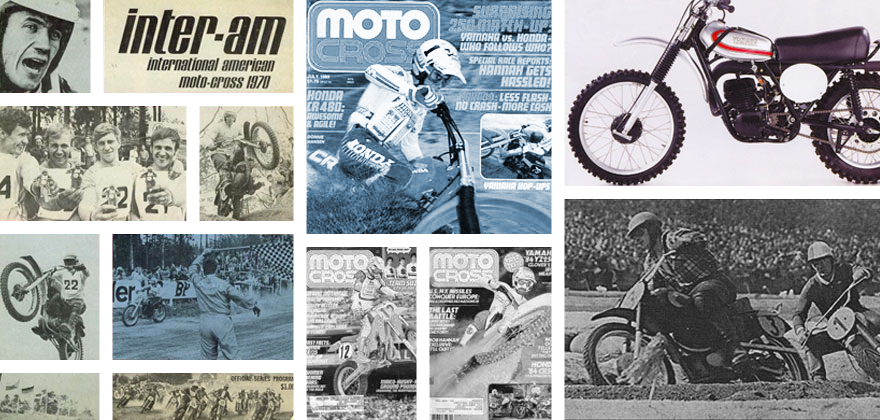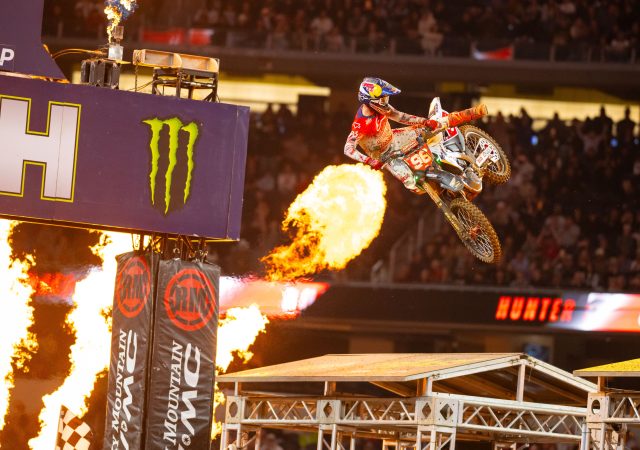Lots of myths in our sport about trainers and what they do. Here’s some thoughts from one that does know
Lots of myths in our sport about trainers and what they do. Here’s some thoughts from one that does know
We’ve done some Rider X columns and a Mechanic X column on the site and they were pretty popular so I wanted to get a trainers take on what goes on in our sport. The easiest way to get the real thoughts on things is to promise them anonymity on things. This is a guy who’s worked with some top level riders in the sport from time to time and isn’t in the sport currently but was in recently. Some wise word from an educated man right here. Enjoy!- Matthes
You came from a sports science background working with a lot of Olympic-level athletes. When you first came into the motocross world what kind of things did you think about our sport as a newbie coming into the sport for our athletes?
Trainer X: I think when it comes to fitness level that the level is pretty high because the sport is so demanding, but what I was most shocked about was that such a high level of money, coming from different olympic sports – normally in that sense you don’t get paid until you win the medal. There was a high level of money in moto but the people that surrounded some of the riders and the support structure were not classically trained with degrees, certifications, and so on. So that was my biggest surprise.
As somebody that works with Olympic athletes, were you kind of blown away by the level of fitness it takes to be a top motocrosser?
Not so much because I kind of understood the physiology prior to it. There is some science on it and some data, so I wasn’t too surprised. I knew that if you’re racing two 30 minute motos in outdoor in the middle of the summer, it’s demanding and it’s whole body demanding. So I had already likened it to cross-country skiing, which is another sport that’s super demanding. So I kind of already knew how hard it was.
So ok, you get into the sport. What are some of the mistakes that you’ve seen or heard about from people who are training some of these riders?
I may even back up, I don’t know if it’s necessarily mistakes, but I would back up and say that the sport is not differentiated. In a lot of other professional sports you have a manager, then you have a coach, and then you have physical therapists or support staff within the medical side. And then you have strength and conditioning which is what they call it in classical sports. Some of the other sports its sport science or physiology. And then the next level today is we have kind of sports analytics.
When I got in there, there’d be the manager, and he kind of did a little bit of everything, and then there was a person, and that could have been a medical person, could have been from a chiropractic background, could have been from “I just rode, myself,” could have been strength and conditioning– was all one person. So that’s what I was a little surprised. Their expertise in one area was certainly high but in the actual training or maybe the sports science side of it, it wasn’t that high. So that was strange to me.
It’s definitely different when, say a chiropractor for example, is sort of overstepping his knowledge as far as helping a rider with everything instead of just cracking.
Normally you would have a nutritionist, you would have the physical therapist, and you would have someone that brought it all together, but you would rely on those people’s expertise. Not that some of them don’t have expertise in their area, it just wasn’t classically trained. And then you would have someone at a pretty young age being trained in day-to-day training, but not with a background and knowledge in the actual training or nutrition or so on. So that was really confusing to me because in our Olympic world you really have to be quite an expert and have certifications and degrees and at least understand the whole basics of the physiology of sport. And then you can go out and get a certification in nutrition and you’re probably at a pretty high level. It doesn’t mean you have a PhD in nutrition, but that’s how it normally works. You have a resource of PhD’s in nutrition that you can rely on, and that network, what I found was it was basically two people, a manager and a person, and that person ended up doing lap times at the track. It ended up, “hey, you need to drink more.” “Here’s your training for tomorrow.” That was strange to me.
What were some of the common mistakes that you’ve heard or seen from young riders in your eyes?
The general overriding mistake is that they’re too influenced by whatever the latest trend was. So if yoga for example was a trend, then all of a sudden that year or two people would be doing yoga. You don’t need a bicycle to train for motocross, but yet bicycling became really popular for a number of reasons, and some of them are legitimate. But then everyone’s riding a bike. And then it went to weight training for a period of time there, so then everyone was doing lots of weights. The problem is it’s been too reactionary to whatever their latest trend was, rather than just following the physiology or sports science, fundamentals.
So that’s the common mistake, and then specifically people go off on a tangent where you’ll have one trainer that is really into cycling and they do it too far, because that was the latest trend and that’s what they’re into. And then you have others that are lifting weights so much that it becomes an error. So not one thing is an error. Doing yoga is not an ego, doing cycling is not an error; but when you go off a tangent and that’s all you’re doing and it becomes your fundamental source, I feel like that’s an error. One of the principles of training in every scientific book is specificity. You want to ride a motorcycle fast? You need to ride a motorcycle. You want to ride a bicycle fast? You need to ride a bicycle. So that’s one of the most common errors I see. Whatever you’re competing in, that should be a majority of your time, and then you can structure when to be rested, overloaded, and so on. The rest of it is auxiliary or ancillary training – it’s not priority training.
Do you think that there’s too much bicycle riding going on in a general sense?
From what I’ve seen, just as a bias, I would say yes. But you never know what people are actually truly doing, so that’s kind of word of mouth and what people are saying and how hard. But in general I’d say, yeah, it’s been pushed too much. And just as I thought there was maybe too much weight lifting maybe five years ago.
If some parents pulled you aside and said, “We have the next James Stewart here. He’s really fast. What should we have him do? What should he be doing?”
Well, they have done that to me and it scares the hell out of me. The parents are what scares me because, let’s just take stick and ball sports or whatever. The parent wants to make sure they get the best for the child, but they’re not the ones that are out there timing their motos or doing the free throws with them all the time. They may help them, but there’s a local coach or they send them to basketball camps, they send them to all those things to get help from professionals. I see that the parents drive the children – and they are children, by the way – a little bit too much, and with their own idea of expertise. And then since this sport is such a technical environment with equipment, then pretty soon the motorcycle, the actual tool becomes so much more important than the training, the psychology, and the development of the athlete. You would never judge a fourteen-year-old basketball player on how he’s going to develop. He may be the greatest in the world, but a lot of people in the basketball world would say, “Hey, that guy’s good. He’s got some talent. He’s got a lot of skills.” But they’re not signing him to the 76ers yet. They’re not signing him to a full contract at that age. They may be looking at it more and more, but that’s what I see. The parents are driving the model of “we need this motorcycle. We need it to have this. You need to do this training because I heard this is what that guy does.” I feel like that’s kind of the major issue.
So when they come to me, I always try to get them to take a step back. And it’s really difficult for them, because they have been successful with their child pushing them and being at the track with them. And they have learned, but very few of them were actually ex-professional motocross, and from what I see, the ex-professional motocross guys are like, “hey, it’ll be fine. Let’s not worry about that.” Rather than the parent who isn’t, they want to get involved and “we need this, and we need this exhaust, we need this silencer, we need this guy to do your suspension…” And pretty soon they’re focused on all the wrong things for the development of the child as an athlete rather than as a motocross rider or supercross.
How should a rider pick a trainer? We have trainers in our sport that come from all sorts of backgrounds, not all of them are educated though.
I think it’s the same way that you pick everything. You don’t pick an accountant by if he can add. You’ve got to get some resources. What is the certifications? What is the National Accounting Society? What are your degrees? Same with a doctor, same with a lawyer. So I would say that within that world, and then you need to understand where your expertise lies as a parent and everyone else, and what the actual duty of that person is. So, is it to train? Is it to tell them how to ride? Is it technical? Is it engine? That’s why if you can separate it and then say, okay, you’re a trainer. What are your certifications? What is your experience? I would rather have personally someone who has a much higher level of background in education and a little bit of experience than I would have someone who has a lot of experience and not a lot of background, because then I feel like that person is susceptible to whatever the latest trends are, and the insecurity to be more of a babysitter.
I don’t mean this negatively, but where they go out and do lap times at the track, but really anyone can do that. You can get the data later. None of the sports scientists actually are out there doing the coaching in most other sports. They’re analyzing the data and the progress of the training. Then if you need someone like that and they can do both, great, but I’d rather have the person with the education that has the structure and training in physiology, like peaking and tapering and so on. So I think you have to search out those people that have a lot of that education. I think there are a lot of them out there, they’re just not necessarily in motocross because of some of the previous problems we just discussed.
As a guy that works with Olympic athletes, is WADA a good thing for our sport?
Yeah, any time that there’s a structural governing body for drug testing, that is always a good thing. UFADA and WADA are productive organizations in that sense. There’s got to be a governing body that is testing the fuel, just as there’s got to be a governing body to test in that.
What did you think of the Stewart Adderall controversy/penalty?
Here’s my thing with all those things: if it is prohibited and people knew it was prohibited, that list is publicized to the athlete, and you have to take that seriously. It’s funny because in our world that is so normal that when you go and you say I’m going to go buy a vitamin at the store, you buy two of them and you keep one on the shelf in that lot number to make sure that if something ever happened you could come back and at least justify that it wasn’t intentional that you did it. But if you knew Adderall was illegal, and there is published penalties on what taking a prohibited substance, then I’m all for it. That’s all I really know about that. I know that that was prohibited. There was some degree of whether he had a TUE or a therapeutic use exemption. I don’t know, that’s more within the regulations of it. But here’s a prohibited substance, you took it, here’s your penalty. The penalty is publicized beforehand, I’m all for that.
So if you were a team owner in our sport with million dollar riders, in your opinion you would hire a riding coach, maybe someone like an ex-motocrosser, who can work everything as far as lap times and everything else. And you would hire another person to specifically train the rider, someone who has some degrees, someone who has some sports science behind their name. And they look after the physical needs of the riders. That’s what these teams, in your opinion, should be doing?
Yeah. And just as a rider coach has a lot of connections on suspension and engineering and all that, the sports science person would have connections with nutrition, with doing the testing. So you would go do a physiological test. You would do dietary recalls. You would start to dial in those things and you would have the professionals or the experts who know and can analyze the data with you, and then you bring it all together. So a lot of times in professional sports, in Olympic sports, when you sit down to analyze a rider you go through all the data. So you say, okay, psychologically he just broke up with his girlfriend but his lap times were good today. We’re not going overload him today. We’ve tested him. Nutrition is good, endurance is good. Let’s let him lay low, because he’s going through emotional stress right now. That’s the way you look at all athletes. You never look at just, hey, let’s train him, and go on. But I think a lot of times it’s segmented or segregated too much, where the manager does this and then they just rely on that guy to be doing his job, with the mom or dad involved… and then it just gets all sidetracked. There’s a million examples of that. We only have to look back in history and you’re destined to repeat it if you don’t look at it.
So on a guy that comes from a background like you do, coming in and out of our sport, on a level of 1 to 10, with the millions of dollars at stake, would you put your shocked level at a 7 or 8 as far as how these athletes are handled?
Yeah, definitely when I came in it was an 8. Maybe that’s when I came in the rider I was dealing with and who had trained him previously. I understand it, but maybe we should back up to the beginning and start again, but I saw a lot of the training, the people involved were supplementing their income with supplements or other training devices, so on. So the riders were recommending those devices, those supplements and so on, and they were bought into a false narrative that, “you take this, you will go faster. And then I’m selling that on the side, too.” So I think that’s one of the things that is all encompassing of what we just talked about. If I’m a parent and the guy is recommending this drink I would think, is he getting a kickback from this drink? Why are we taking this drink? Is it nutritional and valid? So I feel like that was a lot of it, because those guys couldn’t make a living on just training a motocross rider and going to the track three times a week, and then going to the gym. They were basically full-time personal trainers, so they needed to make more money by selling some of this other stuff. Then the validity of that other stuff came from who they were training, not necessarily if it was scientifically valid ingredients or drink or device.
Talking to you, a guy who’s very much on the scientific side of things and a pretty smart guy and pretty analytic, but at the end of the day your theories are the same things have worked forever as far as riding a dirt bike. Let’s not overthink this. Keep it simple almost, right?
Science is there to not necessarily prove you’re right, it’s to prove you wrong a lot of times, too. When you set out with a hypothesis we all have bias. So a lot of times these kids get really good by riding a motorcycle. So then if they’re on a decently setup motorcycle, the cream rises to the top. And then you’ve got to get the science to take care of that extra 1% to make sure that can they be the best when they need to be? But now we’ve got to section in emotional stage, injury status, bad suspension and all those kind of things which make maybe 5%. So our job is really that kind of 1 or 2 or 3% at most a lot of times, because they are all fit, like we talked about, and it is a hard sport. But the science is there sometimes. You don’t always want a confirmatory analysis. You want it to prove, “if they do this bike riding, this is going to give them more endurance. This more endurance is going to make them ride faster.” So you test that and then if you’re wrong, that’s good because it proved you were wrong. There’s a classic example, it’s called the Lawson selection test. 90% of us all as humans all fail it, because we always want to have a confirmatory bias. We want to prove we’re right, and that’s the problem. When you look at analysis of things, a lot of times you need to go out and set out, where can I go wrong and why is this wrong first? And then that helps you progress.




